Etherium – Review
by Chris
|
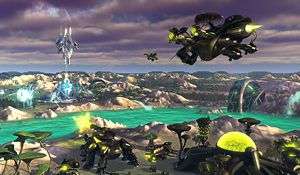 Etherium (not Elysium, as I’ve been calling it because I’m an idiot) is a real-time and turn-based strategy game where three rival factions fight for control over a mysterious resource known as Etherium. Players will take control of one of these factions and begin both a space and planet-based war in order to conquer their enemies and seize victory, using a mix of war machines, recruited neutrals and clever commander powers. If that statement sounds interesting – and to certain gamers it certainly will do – then prepare to mostly be satisfied, but in a way that you might not want to be…
Etherium (not Elysium, as I’ve been calling it because I’m an idiot) is a real-time and turn-based strategy game where three rival factions fight for control over a mysterious resource known as Etherium. Players will take control of one of these factions and begin both a space and planet-based war in order to conquer their enemies and seize victory, using a mix of war machines, recruited neutrals and clever commander powers. If that statement sounds interesting – and to certain gamers it certainly will do – then prepare to mostly be satisfied, but in a way that you might not want to be…
The story for Etherium is paper thin, and anyone looking for a space opera might as well move on because you won’t get it here. The factions all have a little bit of backstory, are set up nicely when you first select them and feel, at the very least, like individuals. This doesn’t really carry over to the main game, however. Alas, in terms of backstory The Consortium, The Awakened of Intar and The Vectides all sound worlds apart from each other and present the player with a choice as to how they’d like to play their game. In terms of what you can actually get up to, the offering is, again, somewhat lacking – Conquest, Skirmish and Ironman modes are what you have to play with.
Conquest is the ‘story’ based side of things, offering single player action against the computer, with skirmish taking up the usual position of single and multiplayer fun. Finally, Ironman mode simply does what it says on the tin and removes the option for players to save manually, instead making it an automatic action only. As it stands, the only way to really play the game is either against the computer or with a friend because multiplayer is somewhat lacking. The option for up to four players to duke it out is present, but in the last fifty days there has been a peak of just fifty players – good signs these are not. I’m certainly not saying that the multiplayer is bad but if you’re thinking picking this up for the multiplayer element, at a minimum, check the levels of players on Steam first.
So, Conquest, which will likely make up most of your time spent with Etherium, has its fair share of Jekyll and Hyde moments and this begins with how you go about your turn. There are a number of rounds to get through, with certain clusters representing different life cycles in the alien beings that deposit Etherium on planets – it might be the ‘gestation’ period for example, for rounds one to three. During these rounds, you can do various things such as move your ship around, take over un-manned colonies, attack rival colonies, play a ‘political card’, heal your ship or upgrade your technology.
 How you go about winning is by scoring victory points for your race by completing various objectives, such as controlling certain planets or having pieces of technology upgraded. It’s nice to have some variety rather than being expected to simply adopt the mentality of ‘crush, kill, destroy’ anything in your path, and although this and almost every other element of Etherium is explained to you, it’s glossed over fairly quickly in the grand scheme of things, and the AI, although somewhat lacking on the battlefield, will happily start scoring victory points right from the off. Once a certain amount has been reached, you just need to hold that number for one full round to win. Like I said, having a focus other than just planetary domination is great but these objectives do lose meaning to a degree when you’re on the ground.
How you go about winning is by scoring victory points for your race by completing various objectives, such as controlling certain planets or having pieces of technology upgraded. It’s nice to have some variety rather than being expected to simply adopt the mentality of ‘crush, kill, destroy’ anything in your path, and although this and almost every other element of Etherium is explained to you, it’s glossed over fairly quickly in the grand scheme of things, and the AI, although somewhat lacking on the battlefield, will happily start scoring victory points right from the off. Once a certain amount has been reached, you just need to hold that number for one full round to win. Like I said, having a focus other than just planetary domination is great but these objectives do lose meaning to a degree when you’re on the ground.
The other elements of space combat work fine, if not a little underwhelming. The combat between ships is dull, a coloured blip exchanged that may or may not miss. Given that the enemy ship returns fire automatically, it can be infuriating to have your shot miss but theirs hit for no other reason than ‘just cause’. The technological upgrades and political cards add a nice touch alongside the main strategy at play but they’re also pretty straightforward, no-frills kinds of addition.
When you’re not waging war in space, you’ll be doing the territory grabbing, planet side, and this is where most of the game is going to take place. The variety of maps is pretty healthy and each planet comes with its own naturally occurring danger, be it sandstorms, tornadoes or electromagnetic pulses. These are aimed at disrupting play for all persons taking part, although, while some of them are a pain, for the most part they do little more than delay the inevitable. I’ve only ever see them roll through the centre of the map and never come anywhere near your main base, making them far less threatening.
While you’re on the planet, you have two main routes to victory, either through the destruction of the enemy base (hence the redundancy of the main objectives in the grand scheme of things) or by using orbital canons to strike at the enemy fleet. This is a pretty decent tactic, except the threatening-as-a-cup-of-jelly AI make the ‘destroy anything that moves’ option much quicker and far more inviting – it’s a nice alternative should you get stuck in a war of attrition though, although I’ve never had to use it.
Base building and your general map conquest has a refreshing twist on what could have been a carbon copy of any old real-time strategy game. Areas of the map are split into sectors, in a vein very similar to Dawn of War, but rather than just placing buildings upon the nodes to control that sector, you can also build expansions to those nodes. This can be anything from the aforementioned orbital cannons, to strategy centres, technology expansions, advanced etherium extractors and so on. These are important because they allow you to deploy units in other areas of the map, unlock more commander points for your special powers and can heal units. There’s a healthy strategy to be found in the micromanagement of these little sectors. Furthermore, for a limited time, the benefits they bring in can be used to lure neutral persons on the map to fight for your cause. This is how I found myself winning most games – getting a small army of tanks and bombers, supplemented by a free, respawning rebel army. The enemy AI can also joust for their services but in all the games I played, they never once did, even when I once forgot to ask for their help. This was most disappointing because it would have injected some challenge into the process. Instead, I landed a couple of turrets on the outskirts of my territory, spawned an army, recruited a free one, romped over to the enemy base and won the game. Rinse and repeat for as long as you need to feel entertained.
 |
 |
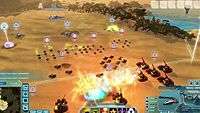 |
 |
 |
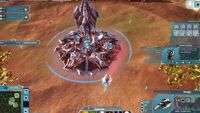 |
I’m not trying to be a smart-arse or say the game lacks challenge but there wasn’t a whole lot for me to do when I was actually playing the game. My mood switched to frustration at the lacklustre and faulty space combat to the dull drudge planet warfare. Combine this with the fact that there is no auto resolve on enemies attacking you on their turn, meaning you can end up playing the same map and possibly fight four times before getting back to your turn, and you can see why you might loose your marbles a bit. To its credit, Etherium’s AI is quick off the mark, is a constant presence and never gives up trying to attack you. To its discredit, it’s as dumb as a bag of nails on the normal difficulty, never tries anything other than just rushing your nearest territory and doesn’t have a plan B for when you up your technology levels. Like I said, Jekyll and Hyde.
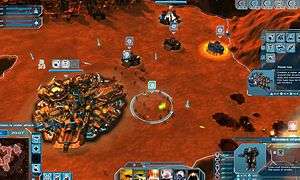 Your own armies don’t fair much better. Every single one of them, from the men to the tanks to the planes are all so painfully slow. I got some men picked up in a transport plane and watched as they were matched for pace by tanks. Tanks. I didn’t bother again and decided that I’d rather not expend the energy capturing extra points on the map if it meant watching them move slower than a snail stuck in treacle. The details on the character models isn’t great and, for the most part, the differences between the three factions are purely cosmetic (and even then there isn’t a whole lot to it).
Your own armies don’t fair much better. Every single one of them, from the men to the tanks to the planes are all so painfully slow. I got some men picked up in a transport plane and watched as they were matched for pace by tanks. Tanks. I didn’t bother again and decided that I’d rather not expend the energy capturing extra points on the map if it meant watching them move slower than a snail stuck in treacle. The details on the character models isn’t great and, for the most part, the differences between the three factions are purely cosmetic (and even then there isn’t a whole lot to it).
And yet… this isn’t an awful game. If I’m complaining a lot it’s because there is plenty wrong here but, by equal measure, there is a time sink to be had and, if you can stomach the ropey space combat, the ground stuff is dull but satisfying when you consider your actions on a bigger scale. Each battle is easily won but the war is a son of a bitch. As I’ve already mentioned, the AI heads off, and grabbing victory points long before you know which way is up and it makes for a gripping finish racing to the finale if you’ve not been quick off the mark. One of the more frustrating points is the save system, which allows you to save during the five minute space combat sequence but not the thirty-forty minute planet sequence. Quite a maddening decision indeed and one that has caught me out when real life intervened.
Graphically Etherium isn’t going to melt your graphics card or come close to pushing your hardware in the right direction. For whatever reason I suffered crashes a couple of times at the hands of (I think) some graphical problem – this happened twice without any real explanation, but patches have arrived since the time of writing and this isn’t a deal breaker by any means – just something to consider if you’re running an AMD card. The game itself is okay looking – the details on some vehicles quite well attended to, while seemingly ignored on others. The maps are pretty decent looking and the commander powers make for some flashy light shows but there isn’t a whole lot to write home about here. The same can be said of the sound, which is pretty forgettable, the unit voices being the only thing of real note because they sound half-decent.
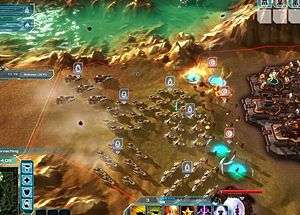 As I’ve already mentioned, there isn’t a whole lot to come back to with Etherium, the Conquest mode being your main source of entertainment, given the lack of multiplayer options. This may change in time but I’d strongly urge anyone to consider alternatives if their main draw to a game is the longevity offered via multiplayer. Ultimately that’s one of the main problems that Etherium has – there are just too many better alternatives currently out there. Company of Heroes, a game that was released nearly ten years ago, offers a better single played and multiplayer experience, with improved graphics and audio. I’m still playing that today and, unfortunately I probably won’t remember Etherium in ten years’ time.
As I’ve already mentioned, there isn’t a whole lot to come back to with Etherium, the Conquest mode being your main source of entertainment, given the lack of multiplayer options. This may change in time but I’d strongly urge anyone to consider alternatives if their main draw to a game is the longevity offered via multiplayer. Ultimately that’s one of the main problems that Etherium has – there are just too many better alternatives currently out there. Company of Heroes, a game that was released nearly ten years ago, offers a better single played and multiplayer experience, with improved graphics and audio. I’m still playing that today and, unfortunately I probably won’t remember Etherium in ten years’ time.
- Some fresh ideas for the RTS genre
- Victory point goal is a better idea than a total war victory, to a degree
- Gameplay comes thick and fast, even if it is a little bland
- Awful save system
- Poor graphics by today's standards
- Pretty 'meh' gameplay, for the most part
Perhaps it's unfair to take a game like Etherium and compare it to the likes of Dawn of War and Company of Heroes. At what point do we judge a game on its own merits and not against those that have come before it? While it has some neat ideas Etherium, unfortunately, won't set the world alight, but if you love the genre and you're looking for your latest fix, you can spend a little time with this and see how you get on. For everyone else, keep moving - there isn't much to see here.
Last five articles by Chris


















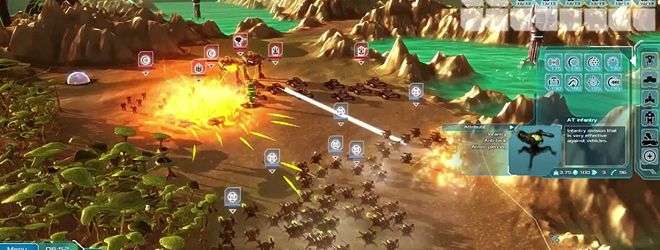






There are no comments, yet.
Why don’t you be the first? Come on, you know you want to!